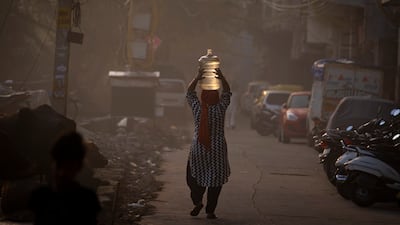Mariam Al Mheiri, Minister of Climate Change and Environment, Minister of State for Food Security, has said collective action needs to be taken to address the challenge of global water scarcity.
Addressing the UN 2023 Water Conference in New York, which coincides with World Water Day, Ms Al Mheiri said innovative solutions are needed to overcome the impact of climate change.
“The stress on our water systems is contributing in evermore concrete ways to food shortages, farmer-herder tensions and migration, ultimately undermining stability in the most fragile areas,” Ms Al Mheiri said.
“With impacts of climate change manifesting most concretely through water — via droughts, flooding, tsunamis — these trends are only likely to worsen.
“The UAE will continue to work with its partners to ensure that the council focuses on practical ways to warranty that climate risks inform its decision-making.”
The UAE depends heavily on desalination — a process that removes salt from seawater — to supply water for drinking and industrial purposes.
Up to 42 per cent of the UAE's potable water requirement comes from about 70 major desalination plants, which account for about 14 per cent of the world's total production of desalinated water.
In 2017, the UAE launched the Water Security Strategy 2036 which aims to ensure sustainability and continuous access to water at any time and condition.
The strategy is centred on ensuring sustainability and continuity of access to water.
It plans to reduce the total demand for water resources by 21 per cent, reducing the water scarcity index by three degrees and increase the rate of reuse of treated water to 95 per cent. The water scarcity index is a measure of how heavily a country’s water assets are used.
Last year, Suhail Al Mazrouei, Minister of Energy and Infrastructure, said the country was well on track to achieving these goals.
He said the country was moving away from relying on groundwater and energy intensive methods of desalination.
Authorities in the UAE are developing more energy-efficient desalination plants that use reverse osmosis — a low energy way to purify water using membrane technology. Renewable energy systems are also being used in these plants, creating greater efficiencies.
Mr Al Mazrouei said the UAE would also share its expertise on conservation with nations facing water scarcity.















